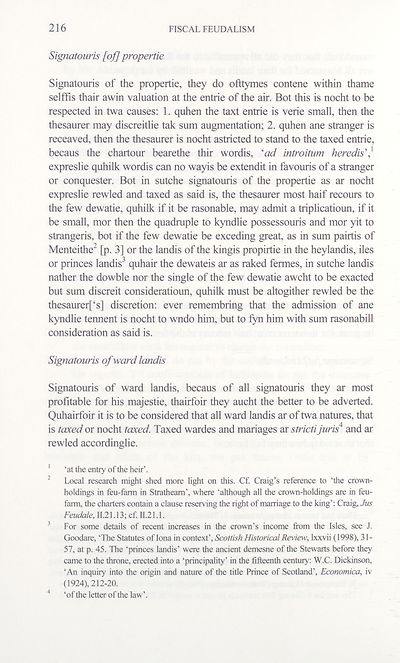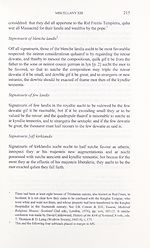Series 5 > Miscellany [of the Scottish History Society] XIII
(231) Page 216
Download files
Complete book:
Individual page:
Thumbnail gallery: Grid view | List view

216
FISCAL FEUDALISM
Signatouris [of] propertie
Signatouris of the propertie, they do ofttymes contene within thame
selffis thair awin valuation at the entrie of the air. Bot this is nocht to be
respected in twa causes: 1. quhen the taxt entrie is verie small, then the
thesaurer may discreitlie tak sum augmentation; 2. quhen ane stranger is
receaved, then the thesaurer is nocht astricted to stand to the taxed entrie,
becaus the chartour bearethe thir wordis, "ad introitum heredis’,'
expreslie quhilk wordis can no wayis be extendit in favouris of a stranger
or conquester. Bot in sutche signatouris of the propertie as ar nocht
expreslie rewled and taxed as said is, the thesaurer most haif recours to
the few dewatie, quhilk if it be rasonable, may admit a triplicatioun, if it
be small, mor then the quadruple to kyndlie possessouris and mor yit to
strangeris, bot if the few dewatie be exceding great, as in sum pairtis of
Menteithe2 [p. 3] or the landis of the kingis propirtie in the heylandis, iles
or princes landis3 quhair the dewateis ar as raked fermes, in sutche landis
nather the dowble nor the single of the few dewatie awcht to be exacted
but sum discreit consideratioun, quhilk must be altogither rewled be the
thesaurer[‘s] discretion: ever remembring that the admission of ane
kyndlie tennent is nocht to wndo him, but to fyn him with sum rasonabill
consideration as said is.
Signatouris of ward landis
Signatouris of ward landis, becaus of all signatouris they ar most
profitable for his majestic, thairfoir they aucht the better to be adverted.
Quhairfoir it is to be considered that all ward landis ar of twa natures, that
is taxed or nocht taxed. Taxed wardes and manages ar stricti juris4 and ar
rewled accordinglie.
1 ‘at the entry of the heir’.
2 Local research might shed more light on this. Cf. Craig’s reference to ‘the crown-
holdings in feu-farm in Stratheam’, where ‘although all the crown-holdings are in feu-
farm, the charters contain a clause reserving the right of marriage to the king’: Craig, Jus
Feudale, 11.21.13; cf. 11.21.1.
3 For some details of recent increases in the crown’s income from the Isles, see J.
Goodare, ‘The Statutes of Iona in context’, Scottish Historical Review, Ixxvii (1998), 31-
57, at p. 45. The ‘princes landis’ were the ancient demesne of the Stewarts before they
came to the throne, erected into a ‘principality’ in the fifteenth century: W.C. Dickinson,
‘An inquiry into the origin and nature of the title Prince of Scotland’, Economica, iv
(1924), 212-20.
4 ‘ofthe letter of the law’.
FISCAL FEUDALISM
Signatouris [of] propertie
Signatouris of the propertie, they do ofttymes contene within thame
selffis thair awin valuation at the entrie of the air. Bot this is nocht to be
respected in twa causes: 1. quhen the taxt entrie is verie small, then the
thesaurer may discreitlie tak sum augmentation; 2. quhen ane stranger is
receaved, then the thesaurer is nocht astricted to stand to the taxed entrie,
becaus the chartour bearethe thir wordis, "ad introitum heredis’,'
expreslie quhilk wordis can no wayis be extendit in favouris of a stranger
or conquester. Bot in sutche signatouris of the propertie as ar nocht
expreslie rewled and taxed as said is, the thesaurer most haif recours to
the few dewatie, quhilk if it be rasonable, may admit a triplicatioun, if it
be small, mor then the quadruple to kyndlie possessouris and mor yit to
strangeris, bot if the few dewatie be exceding great, as in sum pairtis of
Menteithe2 [p. 3] or the landis of the kingis propirtie in the heylandis, iles
or princes landis3 quhair the dewateis ar as raked fermes, in sutche landis
nather the dowble nor the single of the few dewatie awcht to be exacted
but sum discreit consideratioun, quhilk must be altogither rewled be the
thesaurer[‘s] discretion: ever remembring that the admission of ane
kyndlie tennent is nocht to wndo him, but to fyn him with sum rasonabill
consideration as said is.
Signatouris of ward landis
Signatouris of ward landis, becaus of all signatouris they ar most
profitable for his majestic, thairfoir they aucht the better to be adverted.
Quhairfoir it is to be considered that all ward landis ar of twa natures, that
is taxed or nocht taxed. Taxed wardes and manages ar stricti juris4 and ar
rewled accordinglie.
1 ‘at the entry of the heir’.
2 Local research might shed more light on this. Cf. Craig’s reference to ‘the crown-
holdings in feu-farm in Stratheam’, where ‘although all the crown-holdings are in feu-
farm, the charters contain a clause reserving the right of marriage to the king’: Craig, Jus
Feudale, 11.21.13; cf. 11.21.1.
3 For some details of recent increases in the crown’s income from the Isles, see J.
Goodare, ‘The Statutes of Iona in context’, Scottish Historical Review, Ixxvii (1998), 31-
57, at p. 45. The ‘princes landis’ were the ancient demesne of the Stewarts before they
came to the throne, erected into a ‘principality’ in the fifteenth century: W.C. Dickinson,
‘An inquiry into the origin and nature of the title Prince of Scotland’, Economica, iv
(1924), 212-20.
4 ‘ofthe letter of the law’.
Set display mode to:
![]() Universal Viewer |
Universal Viewer | ![]() Mirador |
Large image | Transcription
Mirador |
Large image | Transcription
Images and transcriptions on this page, including medium image downloads, may be used under the Creative Commons Attribution 4.0 International Licence unless otherwise stated. ![]()
| Scottish History Society volumes > Series 5 > Miscellany [of the Scottish History Society] XIII > (231) Page 216 |
|---|
| Permanent URL | https://digital.nls.uk/127316301 |
|---|
| Description | Over 180 volumes, published by the Scottish History Society, containing original sources on Scotland's history and people. With a wide range of subjects, the books collectively cover all periods from the 12th to 20th centuries, and reflect changing trends in Scottish history. Sources are accompanied by scholarly interpretation, references and bibliographies. Volumes are usually published annually, and more digitised volumes will be added as they become available. |
|---|


